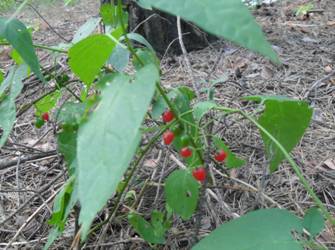


Nightshade (Solanum), fam. Solanaceae.
There are two species in the forest – Bittersweet Nigtshade (Solanum dulcamara) and Black Nightshade (Solanum nigrum). Both are poisonous; there is information that completely ripe berries are almost non-toxic, but it is better not to risk. Solanine, the nightshade poison, is found in small quantities in many familiar food – potatoes, tomatoes, and eggplants. From one point of view, this proves that it is not so dangerous; from another, these vegetables sometimes could accumulate excessive quantities of solanine. For example, many people did not even suspect themselves to be prone to arthritis until they adopt a diet including too much plant produce from the nightshade family. It is especially true for underripe, overripe, or too small vegetables (note that the quantity of solanine is roughly the same in each fruit – thus, a little berry of nightshade might contain as much of it as a 300-gram tomato). Analogously, you should never try the leaves, shoots of these vegetables, as well as the potato "berries".
Like other medicinal plants that cannot be assumed not harmful and also are not very effective, the nightshade use is limited. Bittersweet nightshade has diuretic and sudorific properties. The berries of black nightshade have laxative, antipyretic, antiinflammatory, and diuretic action.